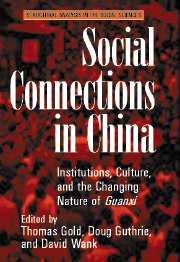Prologue
Published online by Cambridge University Press: 30 July 2009
Summary
In the fall of 1998, the Center for Chinese Studies at the University of California, Berkeley, under the direction of Thomas Gold, brought several scholars from around the world to talk about guanxi, a phenomenon we had all written about in one way or another. We wanted not only to explore several substantive issues – the importance of guanxi in Chinese societies, the conditions under which it is alive and thriving in China today, the extent to which it is linked to Chinese culture, its fate in China's economic reforms – but also to examine the ways this important Chinese phenomenon had been treated in academic scholarship and popular discourse over the years. As these discussions got under way, we were struck by something else: While actual research that discussed the phenomenon of guanxi in China was relatively young – scholars have really only been discussing the topic directly since the mid-1970s – there has been an absolute explosion of scholarship on the topic in recent years.
Though not the first to write about the phenomenon, Thomas Gold published one of the early essays in 1985 that addressed the issue directly from the perspective of its changing role in China's economic reforms. And while the early works of Andrew Walder (1986) and Jean Oi (1989) do not spend much time discussing guanxi per se, the issue of social relations in China is clearly central in their examinations of Chinese political economy.
- Type
- Chapter
- Information
- Social Connections in ChinaInstitutions, Culture, and the Changing Nature of Guanxi, pp. xv - xviiiPublisher: Cambridge University PressPrint publication year: 2002

